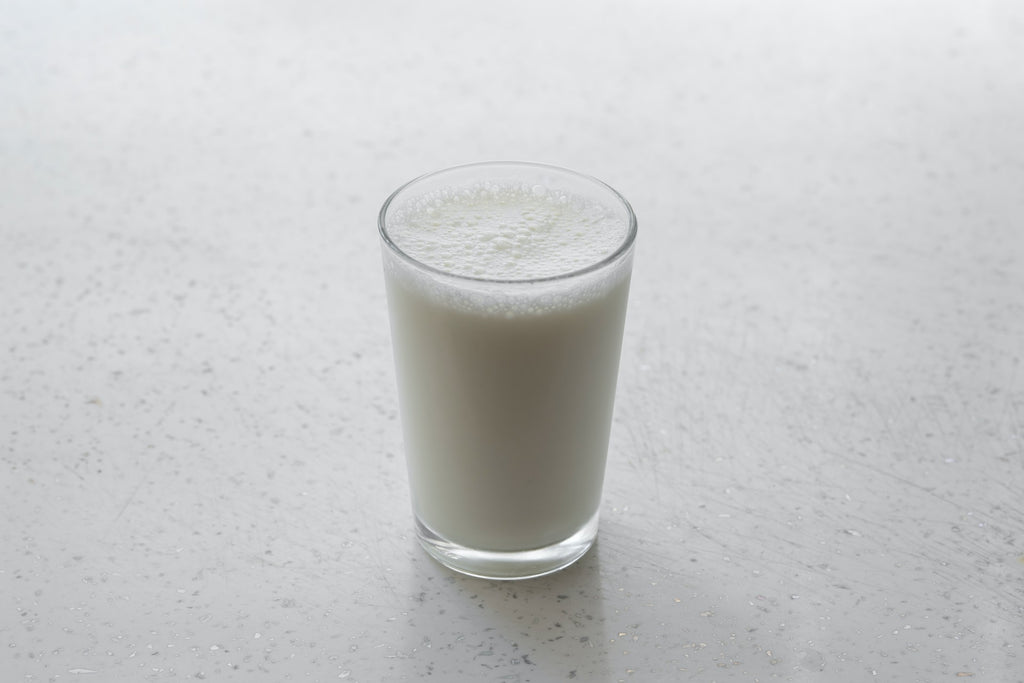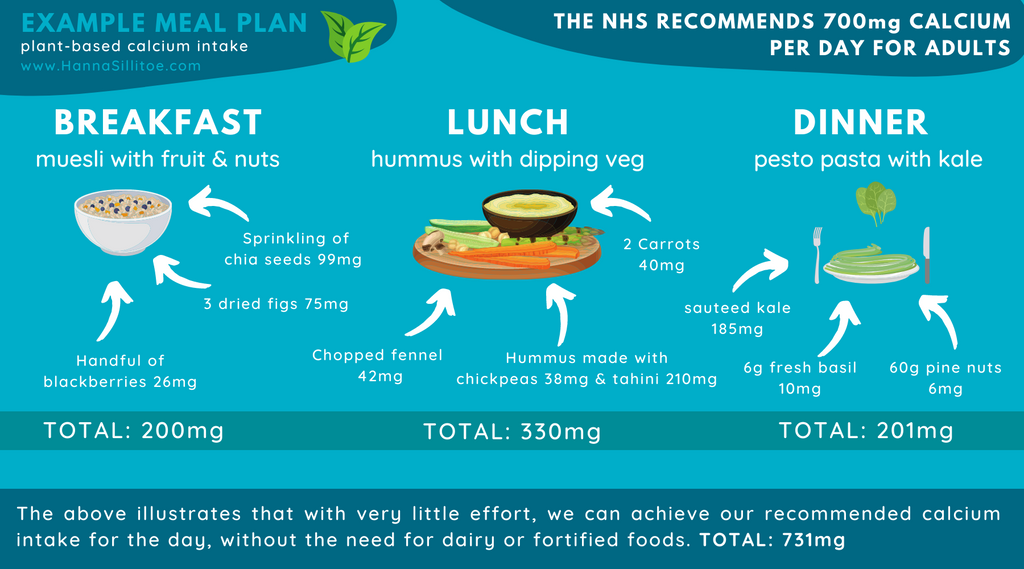There is a potential link between dairy and inflammatory skin conditions, resulting in many people wanting to try a plant-based diet to see if it has any impact on their skin. One highlighted concern when people come to me for advice in eliminating dairy and animal products is often 'where will I get my calcium from?'
What do we Need Calcium For?

Before we establish the best source of calcium, let's look first at what we need it for. If you're old enough you might remember the old television adverts from the eighties and nineties encouraging us to drink more milk to make our bones grow stronger.
Calcium is a mineral that helps our muscles, nerves, and cells to work correctly. Bones are where we store calcium in the body so it stands to reason to think we might need it to keep our bones strong. Our body's can't make calcium, we can only absorb what we need through food or from supplements. If we don't get enough calcium in our diet, or if our body is not able to absorb enough calcium, bones can become weak or they won't grow properly.
Our 'bone density' refers to how much calcium and other minerals are stored in our bones and this is typically at its highest when we're between 25 and 35 years old - it's all downhill from there!! As we get older, bones can certainly become more brittle and fragile bones have a tendency to break more easily. You might also have heard of serious medical conditions such as osteoporosis, a health condition that weakens bones, making them fragile and more prone to breaking.
Vitamin D
Unhelpfully our digestive system is not actually very good at absorbing calcium. We typically only take in around 20% of the calcium we need naturally from foods. But the good news is, Vitamin D is a hormone that can help boost the guts calcium absorption. So, as well as looking at our daily calcium requirement, we should also make sure we're getting 800 to 1,000IU of vitamin D each day.
Magnesium
Just to add more complications into the mix, magnesium is another important factor in calcium absorption. It works hand-in-hand with calcium and Vitamin D to support bone health and regulate proper absorption. Making sure we're getting adequate levels of all three vitamins is ideal.
What is Calcium and Where Does it Come From?

Let's begin by looking at what calcium actually is and where it originates. Calcium is a mineral found in soil that's absorbed by plants through their roots. Cows eat grass that's grown rich in calcium, and we're then encouraged to drink milk from a cow, which in turn provides us with our calcium intake. But what if we were to cut out the middleman?
Well, firstly humans can't eat grass! Whilst it's not exactly toxic, the human stomach has significant difficulty digesting raw leaves and grasses. Cows, on the other hand, have a specialised stomach with four chambers, which helps them to digest grass (a process called rumination). Eating grass also requires a great deal of chewing, which is why you might see cows munching away all day. Your dentist would not be too impressed if you ground your teeth down eating grass!
So, if grass is out of the question, which other greens can we humans rely on for a digestible source of calcium? The most abundant greens are leafy vegetables and legumes, or "greens and beans" to keep it simple. Broccoli, Sprouts, Kale, Mustard Greens and Swiss Chard are loaded with highly absorbable calcium and heaps of other incredible nutrients. But greens and beans aren't our only source. Certain grains, nuts, seeds and fruits can also provide us with adequate calcium quantities.
Animal Products Actually Leach Calcium
We've had it drummed into us for many years that milk is essential to help our bones grow strong, but more and more research is emerging which leads us to question this statement.
A 1994 study of elderly men and women in Sydney, Australia, showed that in fact higher dairy product consumption was associated with increased bone fracture risk with those patients regularly drinking milk doubling their risk of hip fractures. Similarly a twelve year Harvard study of 72,000 women, found that those who drank milk three times a day actually broke more bones than women who rarely drank milk.
Furthermore, studies show that animal proteins found in fish, chicken, red meat, eggs, and dairy products create acidity, which leaches calcium from our bones and encourage its passage into our urine. The plant proteins found in beans, grains, and vegetables do not appear to have this same negative acidic leaching effect.
How Much Calcium do we Need?
In the UK the NHS suggests adults aged between 19 and 64 should aim to consume 700mg of calcium a day. The World Health Organisation recommends slightly less at 500 mg per day. Anywhere between these figures is probably about right. Consuming too much calcium (more than double this amount) could lead to stomach upsets and diarrhea, so it's equally important not to over do it!
Bioavailability of Calcium
When we look at the calcium content in foods, it isn't just the printed figures we need to take into account. The amount of calcium that is actually absorbed and used by the body from the foods we eat is called “calcium bioavailability.” Some foods offer a higher calcium bioavailability than others.
To illustrate this point, dairy foods have a bioavailability of about 30% absorption. This means that if a carton of milk says it offers 240mg calcium per cup, only about 80mg will actually be absorbed and utilised by our body. Plant foods, like leafy greens, might contain less calcium gram for gram, but they have a higher bioavailability than dairy. Take kale for example: at 160 mg of calcium per serving, it has a bioavailability of around 50%, so you're also going to be absorbing 80mg. Eating one portion of kale therefore is going to give you just as much bioavailable calcium as one cup of milk.
What About Kefir, Yoghurt Shots and Goats Milk?

I read a lot about the benefits of kefir, goats milk and those little Yakult shots when it comes to promoting good gut health. In truth there are plenty of plant-based alternatives which are on a par, if not better! Yakult would certainly not be recommended. Not only is it full of sugar, it's probiotic content is negligible.
Kefir, is a fermented milk drink similar to a thinned down yogurt, that's made from kefir grains, a specific type of symbiotic culture. Since it's a fermented food product, it's rich in probiotic bacteria.
Whilst kefir is traditionally made from cow’s milk, it can also be produced from goats or sheep's milk. Nowadays there are also Kefirs made with coconut and other non-dairy milks. If it's something you'd like to try, I'd opt for a non dairy version.
If you need an inflammation lowering, good gut bacteria promoting, dairy-free alternative for your skin, my Multi Strain Biotic would be a good option to try. Unlike probiotic yoghurt drinks and kefir, the cultures are not grown on dairy, so you can be assured it's fully vegan.
Goats milk often contains equal or slightly higher levels of calcium compared to cow's milk. It's packed full of naturally occurring proteins, fatty acids and glycerine, which in turn contribute to its super hydrating properties. This is the reason you might sometimes see it used in skincare.
Some researchers think that drinking goat's milk may help ease the inflammation associated with skin conditions, but much more research is needed to establish whether this is true. And chances are, if you're allergic to cow's milk, you're most probably allergic to goat’s milk too. If you do have a dairy allergy, applying goats milk products to your skin is not recommended. If you're looking for a soap that's going to hydrate and replenish moisture in your skin leaving it feeling silky soft, I'd highly recommend this Hydrating Cleanser instead.
Best Plant Based Calcium Sources
Plant-Based Milks
You might have noticed supermarket products labelled as 'fortified'. This means they're had vitamins added to them to increase their nutritional content. Plant milks for example are sometimes 'fortified with calcium', which gives them a higher calcium content. A 200ml glass of fortified plant milk will typically provide 240mg of calcium, but there is evidence to suggest the added calcium in plant-based milks is not absorbed as well as the calcium found naturally in foods.
Vegetables
Based on a single serving (an 80g portion) the following leafy greens provide the best vegetable sources of calcium:
- Kale = 185mg
- Spinach = 120mg
- Purple sprouting broccoli = 88mg
- Turnip greens/tops = 79g
- Okra = 75mg
- Mustard Greens = 64mg
- Spring greens = 60mg
- Pak choi = 58mg
- Swiss Chard = 46mg
- Raw fennel = 42mg
- Broccoli = 35mg
- Brussels sprouts = 21mg
Fresh Fruit
Based on a single serving (an 80g portion) the following leafy greens provide the best vegetable sources of calcium:
- Kiwi = 26mg
- Blackberries = 26mg
- Rhubarb (cooked) = 26mg
- Pear = 6mg
- Apple = 3mg
A 30g portion of dried fruit offers the following:
- Figs = 75mg
- Dates = 20mg
- Raisins = 17mg
Pulses, Beans and Lentils
An 80g serving of cooked legumes can offer levels of calcium as follows:
- Soya beans = 66mg
- Chickpeas = 38mg
- Aduki beans = 31mg
- Kidney beans = 30mg
- Broad beans = 28mg
- Black-eyed beans = 17mg
- Lentils = 17mg
Nuts and Seeds
Nuts and seeds offer a strong source of plant-based calcium and they're such an easy snack to incorporate into your daily diet! Just a handful in muesli or between meals can quickly raise your calcium count for the day. These figures are based on 30g which is a small handful of each.
- Sesame seeds = 201mg
- Chia seeds = 189mg
- Almonds = 81mg
- Brazil nuts = 51mg
- Sunflower seeds = 33mg
- Walnuts = 28mg
- Pumpkin seeds = 12mg
- Pine nuts = 3mg
Dried Herb Plants
Because they also originate from the earth, dried herbs are another fantastic source of calcium. The great thing about these is, they're required in such small quantities to provide an additional calcium boost, you only need to add a teaspoonful to your favourite dish to help you hit your daily target.
- Dried basil = 105mg
- Dried marjoram = 100mg
- Dried thyme = 95mg
- Dried dill = 89mg
- Celery seeds = 89mg
- Dried sage = 83mg
- Dried oregano = 80mg
Taking these figures into account, let's create a simple daily meal plan that would ensure you're getting adequate calcium intake according to official advice.

The above is just a simple illustration to show how easy it is to source your daily calcium intake solely from plant-based foods. This is without even including any fruit and nut snacks or calcium-rich juices. So long as you're eating a healthy and varied plant-based diet, it should not be too difficult to get all the calcium you need.
1 comment
Very interesting. I have cut out dairy but I have been using goats milk soap which I will stop using